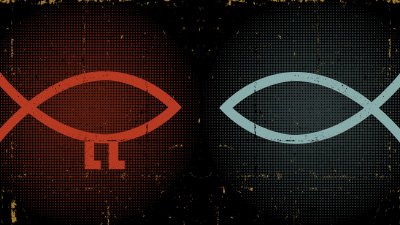
Selfish Gene vs. Social Conquest
News Sources
- The Guardian: “Richard Dawkins in Furious Row with EO Wilson over Theory of Evolution”
- Prospect: “The Descent of Edward Wilson”
Sparks are flying in a war of words waged between “twin giants of genetic theory,” Oxford’s Richard Dawkins and Harvard’s E. O. Wilson. The latest battle erupted when Prospect magazine published Dawkin’s scathing review of Wilson’s new book, The Social Conquest of Earth.
Wilson’s book promotes the idea that “kin selection” inadequately explains the origin of cooperation and that “group selection” must be an additional driving force of evolution. Wilson says “after years of research on the subject”1 in 2010 he joined his voice to those of Martin Nowak and Corina Tarnita to demonstrate, as he writes in the New York Times, “that the mathematical foundations of the kin selection theory are unsound.”2 The three touched off a colossal controversy by publishing their work, “The Evolution of Eusociality,”3 in Nature. (We explored the fallout from that battle in NewScientist: “Cooperative Robots Obey Evolutionary Law”) Last week’s feature, “Snuggle for survival,” further explores “group selection.”
Looking to Darwinian authority, Wilson—whose great area of expertise even according to Dawkins lies with social insects—writes, “Charles Darwin correctly deduced its role, first in the insects and then in human beings — respectively in “On the Origin of Species” and “The Descent of Man.”4
But rebutting the list of scientists Dawkins claims for his own side of the conflict—the “selfish gene/kin selection” side—Wilson points out that scientific truth is not determined by appeal to authority or majority opinion. Wilson writes, “The science in our argument has, after 18 months, never been refuted or even seriously challenged—and certainly not by the archaic version of inclusive fitness from the 1970s recited in Prospect by Professor Dawkins. . . . In any case, making such lists is futile. If science depended on rhetoric and polls, we would still be burning objects with phlogiston [a mythical fire-like element] and navigating with geocentric maps.”5
Wilson points out that scientific truth is not determined by appeal to authority or majority opinion.
So what does Dawkins say about Wilson, and why is he so upset? Dawkins attacks Wilson’s theory—the idea of group selection especially—“as implausible and as unsupported by evidence.” Dawkins writes that to get to the good parts of Wilson’s book about social insects “one is obliged to wade through many pages of erroneous and downright perverse misunderstandings of evolutionary theory.” Dawkins says that Wilson’s book is so full of errors he finds it “impossible to recommend,” concluding, “This is not a book to be tossed lightly aside. It should be thrown with great force.”
Looking back to the “Wilson thesis” as presented in the paper6 co-authored with Nowak and Tarnita, Dawkins writes, “The 2010 paper would never have been published in Nature had it been submitted anonymously and subjected to ordinary peer-review, bereft of the massively authoritative name of Edward O. Wilson. If it was authority that got the paper published, there is poetic justice in deploying authority in reply.” Thus Dawkins justifies his “reluctant” appeal to the authority of “more than 140 evolutionary biologists, including a majority of the most distinguished workers in the field” and accuses Wilson of “wanton arrogance.”
Dawkins primary point is that natural selection operates on genes, not on organisms. The organism is merely a vehicle transporting genes and allowing them to express their phenotypic bids for survival and replication. Since a “group” doesn’t replicate, Dawkins says Wilson doesn’t know what he is talking about. Dawkins explains, “A gene’s success depends on the survival and reproduction of the bodies in which it sits, and which it influences via ‘phenotypic’ effects. This is why I have called the organism a “survival machine” or ‘vehicle’ for the genes that ride inside it.”
A curious point of interest in these arguments is the repeated appeal to authority.
A curious point of interest in these arguments is the repeated appeal to authority. Science shouldn’t be decided by the majority. However, evolutionists routinely point to the majority opinion of mainstream science when supporting evolutionary views that conflict with creationist positions. For this reason, for instance, during the recent debate about the Tennessee Teacher Protection Academic Freedom Act, prominent evolutionists contended vehemently that there really was no controversy because mainstream scientists agreed evolutionary history was factual.
As to authority, in the area of historical/origins science, it is impossible to actually deploy testable repeatable scientific experiments apart from reliance on a number of unverifiable assumptions about the past. After all, the origin of all things already happened. It is impossible to return to time before it happened to run controlled experiments. The authority of a reliable eyewitness—God—weighs in on the side of biblical creation.
Moreover, while debating which way cooperation evolved, both Dawkins and Wilson assume that molecules-to-man evolution and hominid evolution from brutish ape-like ancestors actually happened. Yet those assumptions are based on belief, not testable facts. The combatants here are merely arguing about the target on which natural selection acts.
Dawkins tells us that an organism is a mere vehicle to transport genes. Yet evolutionary dogma maintains that these genes must not only transfer from one vehicle to another of the same kind but also recombine and mutate to create brand new kinds of living vehicles. Somehow, new genetic information must appear. So while the combatants bitterly face off over the subject of natural selection’s attention, they never address the fundamental question of how new kinds could arise from the random knocking about of these genes, much less how life could arise from the cooperation of lifeless molecules.
Further Reading
For More Information: Get Answers
Remember, if you see a news story that might merit some attention, let us know about it! (Note: if the story originates from the Associated Press, FOX News, MSNBC, the New York Times, or another major national media outlet, we will most likely have already heard about it.) And thanks to all of our readers who have submitted great news tips to us. If you didn’t catch all the latest News to Know, why not take a look to see what you’ve missed?
(Please note that links will take you directly to the source. Answers in Genesis is not responsible for content on the websites to which we refer. For more information, please see our Privacy Policy.)
Footnotes
- E. O. Wilson, “Evolution and Our Inner Conflict,” The New York Times, June 24, 2012, http://opinionator.blogs.nytimes.com/2012/06/24/evolution-and-our-inner-conflict.
- Ibid.
- M. A. Nowak, C. E. Tarnita, and E. O. Wilson, “The Evolution of Eusociality,” Nature 466 (August 26, 2010): 1057–1062, doi:10.1038/nature09205.
- Wilson, “Evolution and Our Inner Conflict.”
- R. Dawkins, “The Descent of Edward Wilson,” Prospect Magazine, May 24, 2012, http://www.prospectmagazine.co.uk/magazine/edward-wilson-social-conquest-earth-evolutionary-errors-origin-species.
- Nowak, Tarnita, and Wilson, “The Evolution of Eusociality.”
Recommended Resources

Answers in Genesis is an apologetics ministry, dedicated to helping Christians defend their faith and proclaim the good news of Jesus Christ.
- Customer Service 800.778.3390
- Available Monday–Friday | 9 AM–5 PM ET
- © 2026 Answers in Genesis




